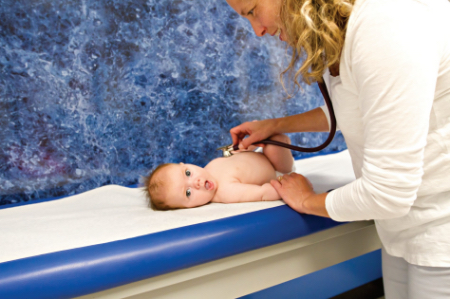
Dr. Willow Monterrosa at Anchorage Pediatric Group has a lot on her mind as the coronavirus looms over her community.
She’s frustrated by the lack of widespread COVID testing, and says it’s stressful not knowing how large or deadly the medical crisis here will become.
“But honestly, I’ve been feeling more stress over being a small business owner and hoping that we can stay afloat and keep our employees employed,” she said.
Gov. Dunleavy announced Tuesday evening he’s lifting his prohibition on elective medical procedures. That does not mean it’s business as usual for the medical sector. Physicians are also constrained by professional guidelines and their own best judgment. And like business owners everywhere, the owners of private medical practices are wondering how they’ll make it without the revenue that used to pay the bills.
Read all of Alaska Public Media’s coronavirus coverage here
Monterrosa and her six partners in the clinic are still seeing babies for vaccinations. Three or four providers do that in the morning. And one or two doctors see acutely sick and injured kids in the afternoon. Monterrosa says appointments are down to about 25% of normal. It’s not enough for a staff of 20.
“We’re really trying hard to keep all of our employees but you know, because we are only seeing essential visits, it’s a lot less busy than we would normally be,” she said.
She “absolutely” supports the measures that have shut off most of her business, but the practice doesn’t have the reserves to keep making payroll like this, Monterrosa said, or not for very long. So they’ve applied for federal help – through the Paycheck Protection Program and the Small Business Administration.
“And really, we have to have that if we’re going to make it through a really unknown, indefinite amount of time of running a slow business,” she said.
In some ways, this is the same problem shopkeepers and hair salons have: Face-to-face business is too dangerous right now. But medical practices aren’t normal businesses. Their closure protects the public health while also threatening the well-being of the businesses the public relies on to stay healthy.
One bright spot these days is telemedicine.
Monterrosa and other Alaska providers, even physical therapists, are now seeing some of their patients on computer screens. Doctors say regulatory hurdles and the reluctance of insurance companies evaporated when the need became evident.
Monterrosa says apps like Zoom are excellent for some problems – like rashes, for instance. And as long as there’s a visual and audio link to the patient, she thinks insurers will reimburse at the same rate as for a regular visit. But there are limitations. She can’t look down a patient’s ear or listen to their lungs over Zoom.
Doctors and clinic managers interviewed for this story thought the COVID shutdown might be the final straw for some practices in Alaska. Health care providers could leave the state, or the older ones might retire early, they said.
At least one Anchorage clinic filed for bankruptcy protection last month. The petition filed by Alaska Urological Institute cites COVID-19 as a factor. (It also says the business lost $3 million in 2019, in part because it had to pay high salaries to attract physicians to Alaska.)
Dr. Michelle Laufer at Medical Park Family Care said her clinic is seeing patients that have to be seen. It is also making significant use of telemedicine, but patient volume is down.
She’s a pediatrician, but her clinic also serves older Alaskans and takes Medicare. Laufer said it helps that Medicare has agreed to pay in advance, for services not yet rendered.
“It’s helpful-ish,” she said, “because it’s like they’re sending (payments) three months ahead, but it all has to be paid off within the next six months or something, and none of us know if that will be possible.”
Laufer said she thinks about all the health screenings that aren’t taking place now and the needs that lie ahead for Anchorage.
“For instance, I was speaking with one of our family practice providers, and she said if she diagnoses three or four new breast cancers a month, those breast cancers are not currently being diagnosed,” Laufer said. “But they’re still there.”
After normal business resumes, she said, there could be a surge of patients but fewer clinicians to serve them.
As for Dr. Monterrosa, her practice, Anchorage Pediatric Group got a reprieve: They learned their Paycheck Protection Program loan was approved. That gives the group two and a half months of payroll.
Liz Ruskin is the Washington, D.C., correspondent at Alaska Public Media. Reach her at lruskin@alaskapublic.org. Read more about Liz here.





